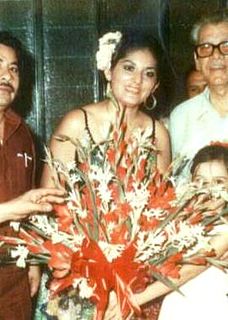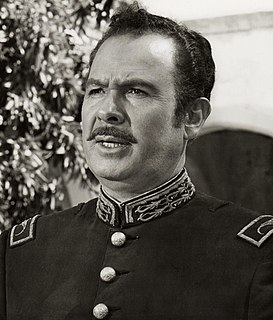Related Research Articles

The music of Mexico is very diverse and features a wide range of musical genres and performance styles. It has been influenced by a variety of cultures, most notably the culture of the indigenous people of Mexico and Europe. Music was an expression of Mexican nationalism, beginning in the nineteenth century.
Ranchera or canción ranchera is a genre of the traditional music of Mexico. It dates to before the years of the Mexican Revolution. It later became closely associated with the Mariachi bands that evolved in Jalisco. Rancheras today are played in virtually all regional Mexican music styles. Drawing on rural traditional folk music, the ranchera developed as a symbol of a new national consciousness in reaction to the aristocratic tastes of the period.
José Alfredo Jiménez Sandoval was a Mexican singer-songwriter of rancheras, whose songs are considered an integral part of Mexico's musical heritage.

María del Rosario Valdez Campos, known professionally as Chayito Valdez, was a Mexican singer and actress who was born in Guasave, Sinaloa, Mexico. She was associated with and contributed to the folk music of Mexico.

Norteño or Norteña, also música norteña, is a genre of Regional Mexican music from Northern Mexico, hence the name. The music is most often based on a polka or waltz tempo and its lyrics often deal with socially relevant topics, although there's also a large amount of norteño love songs. The accordion and the bajo sexto are traditional norteño's most characteristic instruments. Norteña music developed in the late 19th century, as a mixture between German/Czech Folk Music in those years) and local Northern Mexican music.

The corrido is a popular narrative metrical tale and poetry that forms a ballad. The songs are often about oppression, history, daily life for criminals, and other socially relevant topics. It is still a popular form today in Mexico and was widely popular during the Mexican Revolutions of the 20th century. The corrido derives largely from the romance, and in its most known form consists of a salutation from the singer and prologue to the story, the story itself, and a moral and farewell from the singer.

Los Tigres del Norte are a norteño band from San Jose, California, United States.

Antonio Aguilar Barraza was a Mexican singer, actor, songwriter, equestrian, film producer, and screenwriter. He was a man standing at 6'1" with a dominating career in music. He recorded over 150 albums, which sold 25 million copies, and acted in more than 120 films. He was given the honorific nickname "El Charro de México" because he is credited with popularizing the Mexican equestrian sport la charrería to international audiences.
Banda Machos Arre Machos Regional Mexican band originally from Villa Corona, in the state of Jalisco. The band specializes in the Technobanda genre. They are best known for popularizing the Quebradita dancing style that became popular in the 1990s in Mexico and the United States.
The Grammy Award for Best Norteño Album was an honor presented to recording artists at the 51st, 52nd and 53rd Grammy Awards (2009–2011) for quality norteño music albums. The Grammy Awards, an annual ceremony that was established in 1958 and originally called the Gramophone Awards, are presented by the National Academy of Recording Arts and Sciences of the United States to "honor artistic achievement, technical proficiency and overall excellence in the recording industry, without regard to album sales or chart position".
David Záizar was a Mexican mariachi singer and actor who appeared in many Mexican films. He was active from the 1940s up until his death in 1982 due to a respiratory infection. What earned him the title of the "Rey del Falsete" or "King of the Falsetto" was the fact that he displaced Miguel Aceves Mejía, who had the title until Záizar's appearance on the ranchera music scene. His voice is known today as having had beauty, interpretative quality, tone, and plenty of feeling and emotion. Initially, he joined forces with his brother, Juan Záizar, with whom he formed a duo. Prior to this, they had both been working on individual projects, especially Juan, who was a renowned composer and singer. They had only sung together for very special occasions, like their tribute to honor the famous ranchera composer, also from Jalisco, Pepe Guízar. Out of this union came the famous duo, Miguel Aceves Mejía[ the Záizar brothers). Like most Mexican folk songs, the majority of those interpreted by David that we have left today are about lost loves, unfaithful women, Mexico and its people, and several other topics commonly present throughout ranchera music.

Jaula de Oro is the title of a studio album released by the Mexican norteño group, Los Tigres del Norte, in 1984. It was the first number one on the Billboard Regional Mexican Albums.

Los Caminantes are a Mexican Grupera band hailing from San Francisco del Rincón, Guanajuato led by singer-songwriter Agustín Ramírez. Originally called Los Caminantes Aztecas, the group was formed by brothers: Agustín, Brígido, Horacio and Bernardo Ramírez in the mid-1970s. In 1982, Martín Ramírez, the youngest brother of the band, joined the group replacing Bernardo on keyboards. They later acquired Humberto "Pecas" Navarro as their drummer. The band released their debut album Supe Perder in 1983 on Luna Records. Included hits, "Supe Perder," "Para Que Quieres Volver" and "Dime Si Me Quieres."

MTV Unplugged: Los Tigres del Norte and Friends is a live album by Regional Mexican band Los Tigres del Norte. It was recorded before a live audience at the Hollywood Palladium in Los Angeles, California, on February 8, 2011 and released by Fonovisa Records on May 24, 2011. The album includes featured performances by Andrés Calamaro, Calle 13, Zack de la Rocha, Juanes, Paulina Rubio and Diego Torres.

El Ejemplo is a studio album by Regional Mexican band Los Tigres del Norte. It was released by Fonovisa Records on May 2, 1995 and includes fourteen tracks written by Teodoro Bello and Enrique Valencia, which span song styles such as ballads, boleros, corridos, cumbias and rancheras.
La jaula de oro is a title which can refer to several works:
La jaula de oro is a 1987 Mexican film directed by Sergio Véjar inspired by the song of the same name.
Enrique Franco Aguilar is a Mexican-born naturalized American songwriter.
"El circo" is a 1996 song written by Jesse Armenta and recorded by Mexican group Los Tigres del Norte. The song was included in the album "Unidos para Siempre" and topped the US Billboard Hot Latin Songs and Regional Mexican Airplay charts in 1996.
References
- ↑ Yolanda Broyles-González La Historia de Lydia Mendoza: Norteno Tejano Legacies Page 189 - 2003 "This explains, for example, the ongoing tradition of song and countersong that exists in the barrios, whereby a popular song (the cancion ranchera) on immigration like "Jaula de Oro" ("Golden Cage" by Los Tigres del Norte) provokes con- ..."
- ↑ Paul DiMaggio, Patricia Fernandez-Kelly -Art in the Lives of Immigrant Communities in the United States 2010 - Page 183 "In addition to their popular repertoire of corridos that portray immigrants' views and relationships with the United States, such as the songs on the CD La jaula de oro (The golden cage) or in the “Canción 187” (Song 187), they have written the ..."
- ↑ Latina.com
- ↑ Border matters: remapping American cultural studies - 1997 - Page 6 ".. "Jaula de Oro" stands as a corrective to the xenophobic, nationalist, and racist "backlash" in the United States against the estimated four million undocumented workers, more than half residing in California.3 "
- ↑ Joseph S. Tulchin, Andrew D. Selee Mexico's politics and society in transition 2003 -- Page 309 "I have my wife and children Whom I brought when they were small, But they no longer remember My beloved Mexico, Which I never forget And to which I cannot return. What good is money If I'm like a prisoner In this great nation? I weep when ..."
- ↑ Thomas Bender, Carl E. Schorske American academic culture in transformation: fifty years, four ... -1998 Page 186 "(I have my wife and children whom I brought at a very young age. They no longer remember my beloved Mexico, that I never forget and to which I can never return.) De que me sirve el dinero si yo soy como prisionero dentro de esta gran ..."